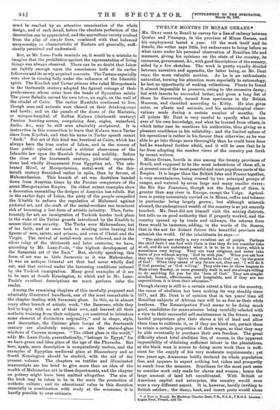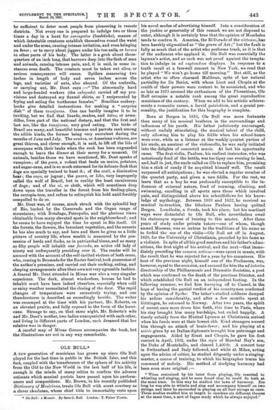TWELVE MONTHS IN MINAS GERAES.*
ME. DENT went to Brazil to survey for a line of railway between Quelaz and Pitangny, in the province of Minas Geraes, and
his employment lasted a year. Of the work itself and its details, the writer says little, but endeavours to bring before us what came under his personal observation of Brazilian life and manners, giving his opinions on the state of the country, its resources, government, &a., with good descriptions of the scenery, aided by a few sketches. The work is pretty equally divided between narrative and appendix, the latter being, as Mr. Dent says, the more valuable portion. As he is an enthusiastic naturalist, turning his attention more especially to entomology, he lost no opportunity of making collections. Plants he found it almost impossible to preserve, owing to the excessive damp; but with insects he succeeded better, and gives a long list of those he discovered, named from specimens in the British Museum, and classified according to Kirby. lie also gives notes on plants and animals, and his meteorological obser- vations made during a certain number of months. On all points Mr. Dent ie very careful to specify what he can aver of his own knowledge, and what he learned from others, in which latter case he mentions his authorities, thus giving us a pleasant confidence in his reliability ; and the limited sphere of his operations is rather in his favour than otherwise, as he was able to go into things more thoroughly than he could have done had he wandered farther afield, and it will be seen that he is far from adopting the sombre views of the country put forth by recent writers.
Minas Geraes, fourth in size among the twenty provinces of Brazil, and supposed to be the most industrious of them all, is at present one of the most peaceful and most populous parts of the Empire. It is larger than the British Isles and France together, is very mountainous, being crossed by two principal groups of ranges, and watered by seven large and many smaller rivers ; the Rio Sim Francisco, though not the longest of them, is greater than any river in Europe, except the Volga. Agricul- ture is pretty extensively carried on in Minas, coffee and tobacco in particular being largely grown ; but although minerals abound, the underground wealth of the country is as yet scarcely touched. Mr. Dent did not himself visit the mining districts, but tells us on good authority that if properly worked, and the country opened up by roads and railways, the returns from them would be immense, adding, in the words of Dr. Soares, that in the not far distant future this beautiful province will astonish the world. Of the inhabitants he says
"The natives are really a very excellent set of people. Perhaps the chief fault I can Hod with them is that they do not consider time at all, and do not understand what it is to be in a hurry, which is sometimes very trying. They are very religious, and never take leave of you without saying, God be with you.' When you ask how they are, they reply, 'Quite well, thanks be to God,' or, by thegrace of God.' When they speak of any future act, they say, ' I will do it if God permits,' or God willing.' They ride two or three leagues to Mass every Sunday, or more generally walk it, and are always willing to do anything for you for the love of God.' They are simple- minded, honest, affectionate, and hospitable, and if they are too superstitious, it is from their education."
Though slavery is still to a certain extent a blot on the country, the cause of abolition has been making its way steadily since 1871, and Mr. Dent is of opinion that in ten years' time all Brazilian subjects of African race will be as free as their white brethren. The Emancipation Fend seems to be doing much good, candidates for manumission being carefully selected with a view to their successful self-maintenance in the future ; many landed proprietors give their slaves a bit of land and allow them time to cultivate it, or if they are hired out, permit them to retain a certain proportion of their wages, so that they may be able eventually to purchase their own freedom. The great difficulty about total abolition lies, of coarse, in the apparent impossibility of obtaining sufficient labour in the plantations, as the black man is averse to doing more work than is suffi- cient for the supply of his very moderate requirements ; yet two years ago, Amazonas boldly declared its whole population free, and appears to expect nothing but riches and prosperity to result from the measure. Brazilians for the most part seem to consider work only made for slaves and women ; hence the large amount of land left uncultivated. With British or American capital and enterprise, the country would soon wear a very different aspect. It is, however, hardly inviting to British settlers ; the damp, heat, and insect pests would alone • A Year in Brasil. Ey Hastings Charles Dent, C.E., F.L.B., F.B.,G.S. London Kagan Peal, Trench, and Co. be sufficient to deter most people from pioneering in remote districts. Not every one is prepared to indulge two or three times a day in a hunt for carrapatos (baet:dicks), masses of which detestable creatures establish themselves round the waist and ander the arms, causing intense irritation, and even bringing on fever ; or to carry about jiggers under his toe-nails, or bernos in other parts of his body. The latter is a grab about three- quarters of an inch long, that burrows deep into the flesh of man and animals, causing intense pain, and, it is said, in some in- stances even death. The creature must be taken out alive, or serious consequences will ensue. Spiders measuring two inches in length of body and seven inches across the legs, and varieties of ants, also abound. Of the umbrella, or carrying ant, Mr. Dent says :—" The abnormally hard and large-headed workers (the cabepudo) carried off my pro- visions and destroyed my flannel shirts, so I reciprocated by frying and eating the toothsome females." Brazilian cookery- books give detailed instructions for making a " surprise dish" of these tanajursts. One can hardly imagine it to be inviting, but we find that lizards, snakes, and tains, or arma- dillos, form part of the national dietary, and that the first and last are, like the tanajuras, very good eating. The birds of Brazil are many, and beautiful toucans and parrots rank among the edible kinds, the former being very succulent during the months of June and July. The urubus, or American vultures, are great thieves, and clever enough, it is said, to lift off the lids of saucepans with their beaks when the cook has been unguarded enough to leave the dinner at their mercy for a moment. Of animals, besides those we have mentioned, Mr. Dent speaks of vampires ; of the paces, a rodent that feeds on maize, potatoes, and sugar-cane, and is so much esteemed for its delicate flesh that doge are specially trained to hunt it ; of the coati, a diminutive bear ; the onpa, or jaguar ; the guara, or lobo, very improperly called the wolf of Brazil, but in reality the least carnivorous of dogs ; and of the ai, or sloth, which will sometimes drop down upon the traveller in the forest from his feeding-place, the cecropia-tree, and refuse to relinquish his hold until forcibly compelled to do so.
Mr. Dent was, of course, much struck with the splendid bay of Rio, backed by the Corcovado and the Organ range of mountains; with Botafago, Petropolis, and the glorious views obtainable from many elevated spots in the neighbourhood ; and he seems to have enjoyed the time he spent in Rio itself. Of the forests, the flowers, the luxuriant vegetation, and the sunsets he has also much to say, and here and there he gives us a little picture of country life, where wealth is measured by the pos- session of herds and flocks, as in patriarchal times, and as many as fifty people will inhabit one fasenda, an active old lady of ninety not unfrequently presiding over it. The reader will be amused with the account of the self-invited visitors of both sexes, who, coming to Brume& for the Easter festival,took possession of the author's premises, and carried out their cooking, eating, and sleeping arrangements after their own not very agreeable fashion. A funeral Mr. Dent attended in Minas was also a very singular experience. The dark, almost windowless, houses he had to inhabit must have been indeed cheerless, especially when cold or rainy weather necessitated the closing of the door. The rapid changes of temperature were excessively trying, and one thunderstorm is described as exceedingly terrific. The writer was encamped at the time with his partner, Mr. Roberts, on an elevated prairie, and fully exposed to the force of the hurri- cane. Strange to say, on that same night, Mr. Roberts's wife and Mr. Dent's mother, two ladies unacquainted with each other, and living in different parts of London, each dreamed that her relative was in danger.
A careful map of Minas Geraes accompanies the book, but the illustrations are not in any way remarkable.















































 Previous page
Previous page